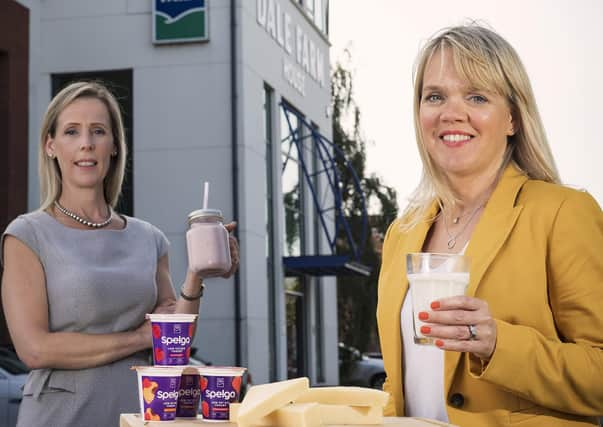Dietitian shines light on dairy


Gillian has partnered with dairy company Dale Farm in a bid to highlight the role that dairy plays in good nutrition at all stages of life, from pregnancy through to older age.
“Dairy provides the body with an abundance of essential nutrients and, at all times of life, it has an important function to play,” Gillian Killiner said.
Advertisement
Advertisement
“2020 has been a particularly challenging time and now that we’re thinking about the darker months when we might be outdoors less, absorbing less Vitamin D and perhaps thinking about supporting our immune system a little more than normal, it is the right time to think about good nutrition overall and often dairy is overlooked as a key food group.
“Most people know that dairy is an excellent source of calcium. Calcium is required for important functions of the heart muscle and all other muscles in the body. It is essential for bone health, eye health, for maintaining blood pressure, immune function and it is utilised in the production of energy to prevent fatigue.
“General dietary recommendations of calcium are around 1000mg per day, more if pregnant, breastfeeding or post-menopausal. The easiest way to consume adequate calcium, is to include three servings of dairy products per day, for example, one glass of milk (200ml), one portion of hard cheese like cheddar (around 35g) and one yogurt (125g). This would make up the majority of your recommended daily calcium intake, and the rest you can achieve from eating non-dairy sources in your diet like green leafy vegetables, tinned fish and beans/pulses. However, some of the calcium in these foods are not as easily absorbed as it is from dairy.
“Dairy has an important role to play at various stages of life for different reasons as our requirements change.
Advertisement
Advertisement
“In pregnancy, calcium is necessary for babies’ growth and development as well as for the mother to maintain adequate calcium levels for her own health. Women experience increased requirements for calcium in pregnancy and breastfeeding.
“In early years, starting a child off with the correct nutrition goes a long way to providing sound foundations to support health in later life. Babies and children up to five years old grow rapidly, with high nutritional requirements. Using full fat milk, cheese and yogurts allows them to obtain a range of nutrients in small volumes.
“Teenagers, especially girls, typically have low intakes of some vitamins and minerals in particular vitamin A, iron, calcium, zinc and iodine, often due to following unbalanced diets or eating processed foods instead of a variety of fresh colourful nutrient rich foods, dairy, healthy fats and protein. Bones develop quickly in teenage years, with 40-60% of peak bone mineral content being laid down in adolescence and 80-90% of the skeleton being formed by the age of 18.
“Dairy is an important choice in providing key nutrients essential for longer term health and especially bone strength.
Advertisement
Advertisement
“For older people, dairy helps to maintain muscle mass and function, critical to prevent falls and breaks. If an individual has been without adequate nutrition for many years, then in older life, they are more susceptible to chronic illness and bone breakages.
“Women over the age of 50 are at high risk of bone disease.
“During menopause, women can lose bone stores, which increases their risk of fractures. Studies show that consuming dairy products can slow the rate of bone loss, which is good news.”